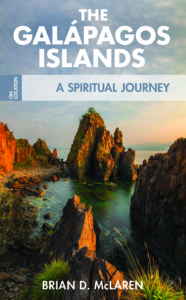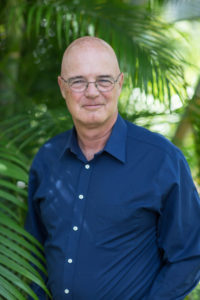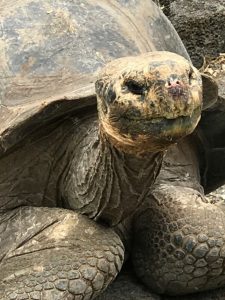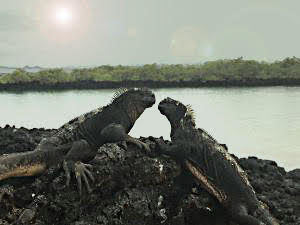Fortress Press; 2019
Who could turn down an all-expenses paid trip to the Galápagos Islands, one of the world’s foremost destinations for wildlife-viewing – with a number of animal species found nowhere else on our planet? Brian McLaren certainly couldn’t.
The rather amazing offer came out of the blue, when McLaren was contacted by his friend Tony Jones, an editor at Fortress Press. Jones was launching a plan for a book series that would be equal-parts travel guide, spiritual memoir and ethical/theological reflection. Would McLaren like to write the first one in the series, and spend some time on the Galápagos Islands? Jones admitted he couldn’t offer an advance on the book…but would cover all expenses.
Thus, the adventure began for well-known public theologian, activist and prolific author Brian McLaren. Knowing about his life-long love for science and nature, I can only imagine how delighted he must have been at the opportunity. The experience culminated in his latest book The Galápagos Islands: A Spiritual Journey, published in October 2019.
Though I’ve been reading many of his books for years, I first got to know Brian McLaren personally while interviewing him in 2018 for Kolbe Times. In the interview, we discussed his inspiring and thought-provoking book The Great Spiritual Migration, How the World’s Largest Religion is Seeking a Better Way to be a Christian (Convergent Books, 2016). We also had a wide-ranging chat about his beliefs, passions, and life story – including his upbringing in a very strict Christian sect called the Plymouth Brethren – and his ongoing spiritual growth and discoveries as an adult.
Near the end of 2019 my husband and I had the great pleasure of seeing McLaren again, when he was in Calgary speaking on the topic of “re-wilding” Christianity. It was a fascinating evening, and the church was packed. In his talk, McLaren pointed out that most theology in recent centuries (especially white Christian theology) has been the work of “avid indoorsmen” – scholars who work in square buildings, surrounded by square books. He went on to speak passionately about the joys of rediscovering Christianity as a religion that is wild rather than domesticated, reconnecting us with soil, sun, water, and wilderness.
One of my favourite parts of his talk was when he reminded us that Jesus, in his upbringing, teaching and practical ministry, was essentially a country boy. He often disappeared into the wilderness, and seemed to love bringing nature into his stories (the “birds of the air” and the “lilies of the field”). Jesus taught on mountainsides, in boats, and on beaches; on Easter morning, Mary Magdalene mistook him for a gardener.
McLaren also talked that evening about his life-changing experiences with nature on the Galápagos Islands. A few months later, with the coronavirus pandemic upon us and travel of any kind becoming a distant dream, it occurred to me how wonderful it would be to get my hands on McLaren’s latest book and “accompany” him on his trip to the Galápagos Islands. I wasn’t disappointed.
nature on the Galápagos Islands. A few months later, with the coronavirus pandemic upon us and travel of any kind becoming a distant dream, it occurred to me how wonderful it would be to get my hands on McLaren’s latest book and “accompany” him on his trip to the Galápagos Islands. I wasn’t disappointed.
The book is a rich and delightful read. In the first half, we traipse along with McLaren and his tour group around “one of the most unique, beautiful and important ecological situations in the world,”1 His portrayals of the animals, landscapes and people that he meets on the islands are illuminating and often humorous, and his descriptions of encounters with so many amazing creatures – from iguanas to pelicans, sea lions to giant tortoises, manta rays to reef sharks – are filled with wonder and joy. I also appreciated how McLaren included his own photos from the trip, as well as some of his favourite quotes from writers, thinkers, poets and other figures.
Tortoises in particular have a special place in McLaren’s heart. As he describes in the book, he now lives in Florida “at the intersection of the Everglades and the Gulf of Mexico”2 where he is raising a small herd of tortoises and turtles in his backyard. You can sense his connection with these remarkable reptiles when he writes about the day on his trip when he and his fellow tour group members spent hours just hanging out with tortoises, overcome by natural reverence:
“Our attentive experience of self-forgetfulness and whole-hearted tortoise observation was, in a real way, ecstatic. We were taken out of ourselves in the contemplation of a creature so different from us in many ways, yet like us in others. We had fallen out of normal concerns and into love, you might say. Or risen into love. Or embarked upon it. Or leapt into it.”3
Throughout the book, McLaren intersperses reflections on his own lifelong love for nature, which was aided and encouraged by his outdoorsy father. McLaren also ruminates on some important questions that made me as a reader pause and ruminate as well – especially when he turns his pen to stories of the thoughtless destruction that has been dealt to these islands and their inhabitants in the past.
McLaren examines our present situation and future outlook, without pulling any punches: “If we don’t develop an economy and a civilization that fit our environment, we simply won’t survive.”4
As a history buff, I was also captivated by McLaren’s compelling and detailed take on the life and work of Charles Darwin. Darwin studied the animals of the Galápagos Islands for five weeks in 1835 while travelling as a naturalist on the HMS Beagle, and went on to publish his theory of evolution in his 1859 book On the Origin of Species. In the end, McLaren bemoans the fact that the figure he describes as a “good and decent man of conscience, struggling to do the right thing at the right time in the right way”5 was seen as a monster by many Christians for decades – including, as McLaren writes, “the conservative Christians in whose company I was raised.”6
The final chapters in the book are beautiful post-trip theological reflections, wide and deep, as he looks back on his Galápagos experience while encouraging us all to expand the perimeters of our ideas of ‘church’ and ‘worship’. McLaren weaves a variety of stories and themes throughout these reflections, such as trout-fishing in Yellowstone National Park, and a comparison of economic systems. Throughout, he also reflects movingly on the evolution of his own faith, and some of the important pitstops along the way.
McLaren’s “Afterword: Play” ends the book with some beautiful advice, especially relevant in these days of self-quarantine and social distancing:
“Perhaps someday you will make that flight to Baltra and begin your own Galápagos adventure. But really, the destination is far less important than the loving attention, the mindful openness, and the playful pace you bring with you next time you walk out your own front door right where you live.”7
Visit Brian McLaren’s website for his blog, upcoming events, books, and other resources.
- McLaren, Brian. (2019). The Gálapagos Islands: A Spiritual Journey. Brentwood, TN: Fortress Press. Xvii.
- Ibid, 4.
- Ibid, 206.
- Ibid, 262.
- Ibid, 163.
- Ibid, 149.
- Ibid, 277.










